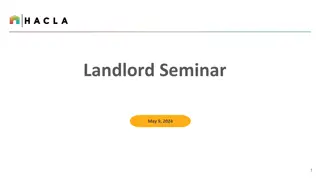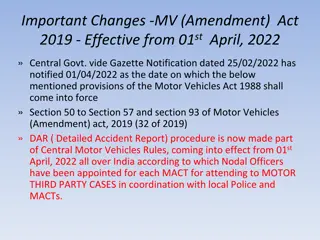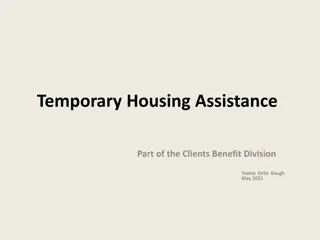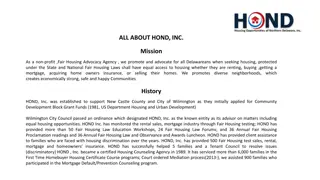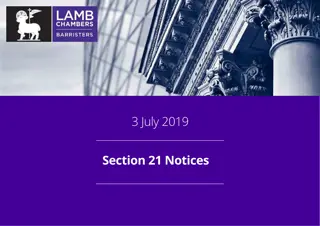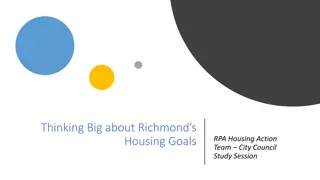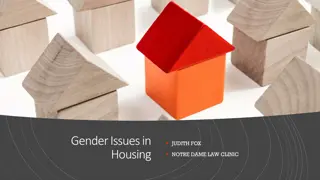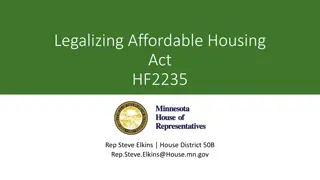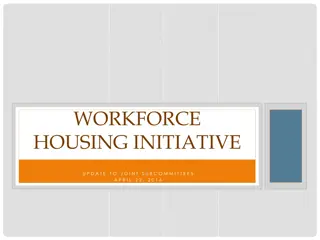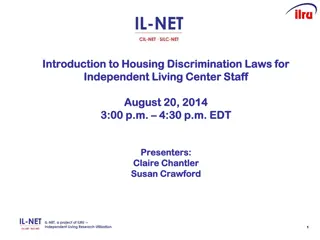Understanding Section 21 of the Housing Act 1988
Exploring the key aspects of Section 21 in the Housing Act 1988, including no-fault possession routes, prescribed notice periods, deposit requirements, and potential upcoming changes. The content covers important provisions such as AST regulations, tenant rights, court processes, fixed terms, break clauses, and rent increases.
Download Presentation

Please find below an Image/Link to download the presentation.
The content on the website is provided AS IS for your information and personal use only. It may not be sold, licensed, or shared on other websites without obtaining consent from the author. Download presentation by click this link. If you encounter any issues during the download, it is possible that the publisher has removed the file from their server.
E N D
Presentation Transcript
Section 21 Housing Act 1988 No fault based route to possession AST At least 2 months notice Not in first four months Prescribed Form 6A www.battens.co.uk Follow us on twitter @BattensSol
Section 21 Requirements Deposit Energy Performance Certificate Gas safety certificate How to Rent guide HMO licence if necessary Return to tenant of any prohibited payments No retaliatory eviction No requirements for Section 8 but this will be changed via existing legislation www.battens.co.uk Follow us on twitter @BattensSol
Summary of proposals Removing ASTs altogether Any circumstances where AST should end without fault? Private and social sector housing? Existing grounds under Schedule 2 to be reformed and new ones added Court processing S8 possession claims more efficiently Landlord to provide grounds www.battens.co.uk Follow us on twitter @BattensSol
Difficulty in obtaining possession through the courts using Section 8 It can take 22 weeks on average Defence and counterclaim New online system to speed up and simplify August 2020 www.battens.co.uk Follow us on twitter @BattensSol
Fixed term or Periodic Parties can agree a set of terms and conditions Rent increases agreed in the contract End of term, unless both parties agree to a new tenancy it will roll on. Tenants can end the contract with one month s notice End by mutual agreement Minimum length of fixed term: 2 years www.battens.co.uk Follow us on twitter @BattensSol
Break clauses Break clause in contract to be agreed Tenant can exercise and leave Landlord exercising break clause and tenant does not leave: possession proceedings www.battens.co.uk Follow us on twitter @BattensSol
Rent Increases Tenant concerns about unaffordable levels of increase in rent No rent increases in the fixed term New contract for new rent negotiations Statutory periodic tenancy Section 13 of the Housing Act 1988 www.battens.co.uk Follow us on twitter @BattensSol
Proposed Changes to Section 8 grounds Ground 1 mandatory currently prior notice must be given that landlord wishes to move in Not in the fixed term Landlord must have lived there before Proposal to include other family members moving in and neither has to have lived there before Still provide notice Perhaps Notice in fixed term: not in 1st2 years? www.battens.co.uk Follow us on twitter @BattensSol
Selling a property Proposing a mandatory ground for possession Notice before the tenancy is signed Can still pursue this ground if no notice: discretion Not in first two years unless extenuating circumstances 2 months notice when exercising this option Proof www.battens.co.uk Follow us on twitter @BattensSol
Rent Arrears Ground 8 mandatory Currently 2 months of arrears: Notice & hearing Grounds 10 and 11 discretionary grounds Tenants buying themselves more time Currently S21 used to avoid potentially lengthy and costly trial. Proposals: Section 8 Notice when 2 months of arrears. Mandatory ground if still has 1 month at the time of the hearing www.battens.co.uk Follow us on twitter @BattensSol
Rent Arrears continued Under one month at this time, discretionary Landlord prove a pattern of behaviour: build up of arrears and reduce down 3 times, mandatory Landlords protected from tenants abusing the ground www.battens.co.uk Follow us on twitter @BattensSol
Anti-social Behaviour Social landlords have a range of powers to deal with tenants Private landlords: anti-social behaviour difficult to use Ground 7A mandatory: tenant convicted of serious offence in or around the property against someone living in or around the property or the landlord www.battens.co.uk Follow us on twitter @BattensSol
Anti-social behaviour continued Ground 12 discretionary: any obligation of the tenancy (other than payment of rent) has been broken or not performed Ground 14 discretionary: a tenant or occupant has been guilt of anti-social behaviour Government suggests that the terms of the tenancy agreement are strengthened in order to use ground 12 more easily www.battens.co.uk Follow us on twitter @BattensSol
Anti-Social behaviour continued Grounds 7A and 14 Serious levels cause concern and easy at present to use Section 21 Anti-social behaviour: nuisance (parties or loud music), vandalism (such as graffiti), environmental damage (littering), uncontrolled animals Evidence is the problem www.battens.co.uk Follow us on twitter @BattensSol
Property Standards All landlords (private and social) are legally required to ensure that any dwelling they rent out is free from serious hazards: damp, excess cold, electrical faults as well as fire and falls. Landlords need to be able to carry out their duties to prevent harm. Tenants sometimes refuse them entry www.battens.co.uk Follow us on twitter @BattensSol
Ground 13 Housing Act 1988 Ground 13 to be amended: evict tenant for obstructing landlord carry out safety duties Ground 13 discretionary: the tenant has caused the condition of the property to deteriorate www.battens.co.uk Follow us on twitter @BattensSol
Accelerated Possession Currently used with Section 21 No hearing if the claim is undefended Proposal to use accelerated possession for some or all of the mandatory grounds within Schedule 2 www.battens.co.uk Follow us on twitter @BattensSol
Specialist provisions Student accommodation: flexibility is required Currently ground 4 mandatory can be used for student accommodation Propose to widen this to student accommodation provided by private landlords where a course has ended www.battens.co.uk Follow us on twitter @BattensSol
Short term lets New regime not suitable to lettings for short periods of time e.g. through the internet and mobile phone apps A second home for work purposes Other work related reasons Transitional lets eg when buying a new home but can t move in immediately www.battens.co.uk Follow us on twitter @BattensSol
Agricultural tenancies Possibly a new ground under schedule 2: Possession of a sub-lease where the head tenant wants to provide vacant possession of their holding Possession of tenanted dwellings on agricultural holdings where there is a business need for the landlord to gain possession e.g so they can re- let the dwelling to a necessary farm worker www.battens.co.uk Follow us on twitter @BattensSol
Other Matters Briefly Homes (Fitness for Human Habitation) Act 2018: 20/3/20 Minimum Energy Efficiency Standards Regulations (MEES) 2015: 1/4/20 Tenant Fees Act 2019: 1/6/20 Rent to Rent: Goldsbrough v CA Property Management Ltd Rent Repayment Order against the original landlord Housing and Planning Act 2016 Electrical Safety Standards PRS HSP Act 2016 S122 www.battens.co.uk Follow us on twitter @BattensSol



